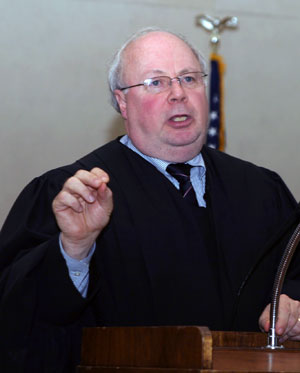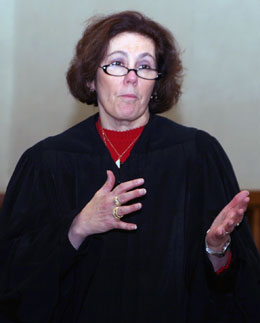Wabash students had the chance Thursday to witness an Indiana Appeals Court hearing which involved a dispute on Indiana’s Habitual Offender Law. They not only witnessed the court proceeding, but in the Chief Judge’s words saw something "rather extraordinary" when the attorney representing the state made an admission the law had been applied incorrectly by the trial court.
 The Indiana Appeals Court has been hearing oral arguments around the state for nearly a decade. Each judge travels about 10 times a year.
The Indiana Appeals Court has been hearing oral arguments around the state for nearly a decade. Each judge travels about 10 times a year.
"The process is very important to the appellate process in general," said Chief Judge James S. Kirsch. "The oral arguments bring cases to life. They help us to understand issues. They give us an opportunity to resolve the questions we may have that aren’t answered in the briefs and other research.
"And we really see it as an outreach and as an education, an opportunity for people who otherwise wouldn’t get to see the process to see it up close and personal."
Kirsch has made five or six trips to Wabash for such hearings. He now has added incentive to make the annual Wabash trip. His son, Adam ’07, is a Wabash College student.
The court heard the case of Puckett v. State, which involved questions of the sentencing procedure. At issue was the application of Indiana’s habitual offender statute for traffic violators (relating to operating a motor vehicle while intoxicated) in determining sentencing and whether or not the defendant, who was left without counsel at the time of sentencing, experienced a violation of his Sixth Amendment right to counsel.
After the Greenwood lawyer representing the appeals case made his argument, the Attorney General’s lawyer representing the state opened his remarks by saying the office is most "responsible for seeing justice is done."
 The attorney then admitted the application of the habitual offender sentence was not proper in this case. At the conclusion of the hearing, Judge Kirsch commended the defense attorney and particularly the state’s attorney for their presentation. Kirsch then made a point to the students they had actually witnessed something rather extraordinary.
The attorney then admitted the application of the habitual offender sentence was not proper in this case. At the conclusion of the hearing, Judge Kirsch commended the defense attorney and particularly the state’s attorney for their presentation. Kirsch then made a point to the students they had actually witnessed something rather extraordinary.
A question and answer period followed, but no question applying to the hearing were permitted.
"This was my first experience seeing a court hearing," said Jay Horrey ’09. "It was a great first-hand learning experience."
Dr. Allwyn Tellis’ Legal Debate class was in attendance for the hearing. The class has been planning to argue this specific case but the Attorney General’s admission the sentencing was incorrect might have thrown the class for a loop.
Justin Liedel ’09 was there because his Political Debate class is planning an appellate case. "It was great to see it done by professionals," Liedel said. "It was rather different than I expected it to be."
The uniqueness of having an appeals court hearing across the state, often at educational institutions leads to lots of interesting questions.
"The most frequent question I get, traditionally with junior high students or young high school students, is, ‘What do you wear under your robe?’ " Judge Kirsch said, with a chuckle. "We’ve been asked everything from what kind of cars do we drive to what’s our favorite fast food restaurant.
"But we also get some really good questions about the system. Typically it depends on the teachers and the amount of work they have done in preparing the students. A lot of them do projects that are collateral to the argument. In some cases on the high school level, they will have the students decide the case they heard the argument on."
The Appeals Court was on campus last year but a last minute cancellation meant just a question and answer session instead of a full hearing. Judges Patricia Riley and Margaret Robb joined Kirsch on the panel.
Hewitt is Wabash College's Director of New Media/Web Editor. Royce Gregerson '09 also contributed to this story.
In photos:
Top left: Judge Kirsch takes questions after the hearing.
At right: Judge Robb answers a students' question.
On home page: Judges Riley, Kirsch, and Robb come out from behind the panel to talk with students, faculty, and guests.